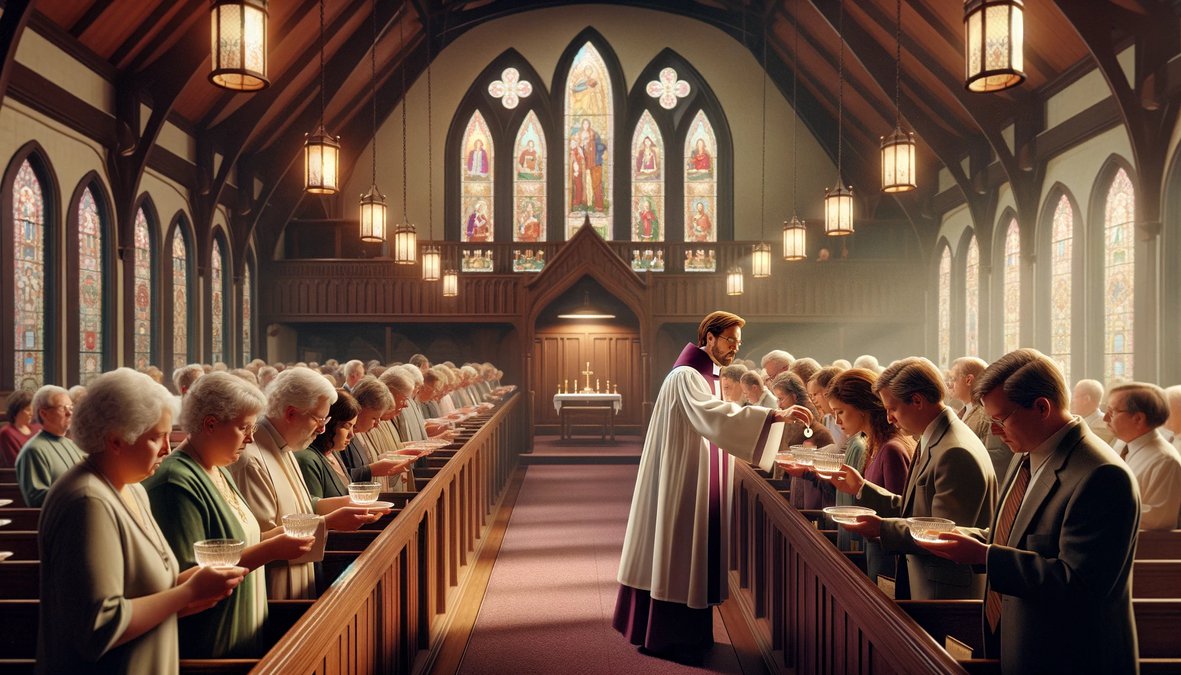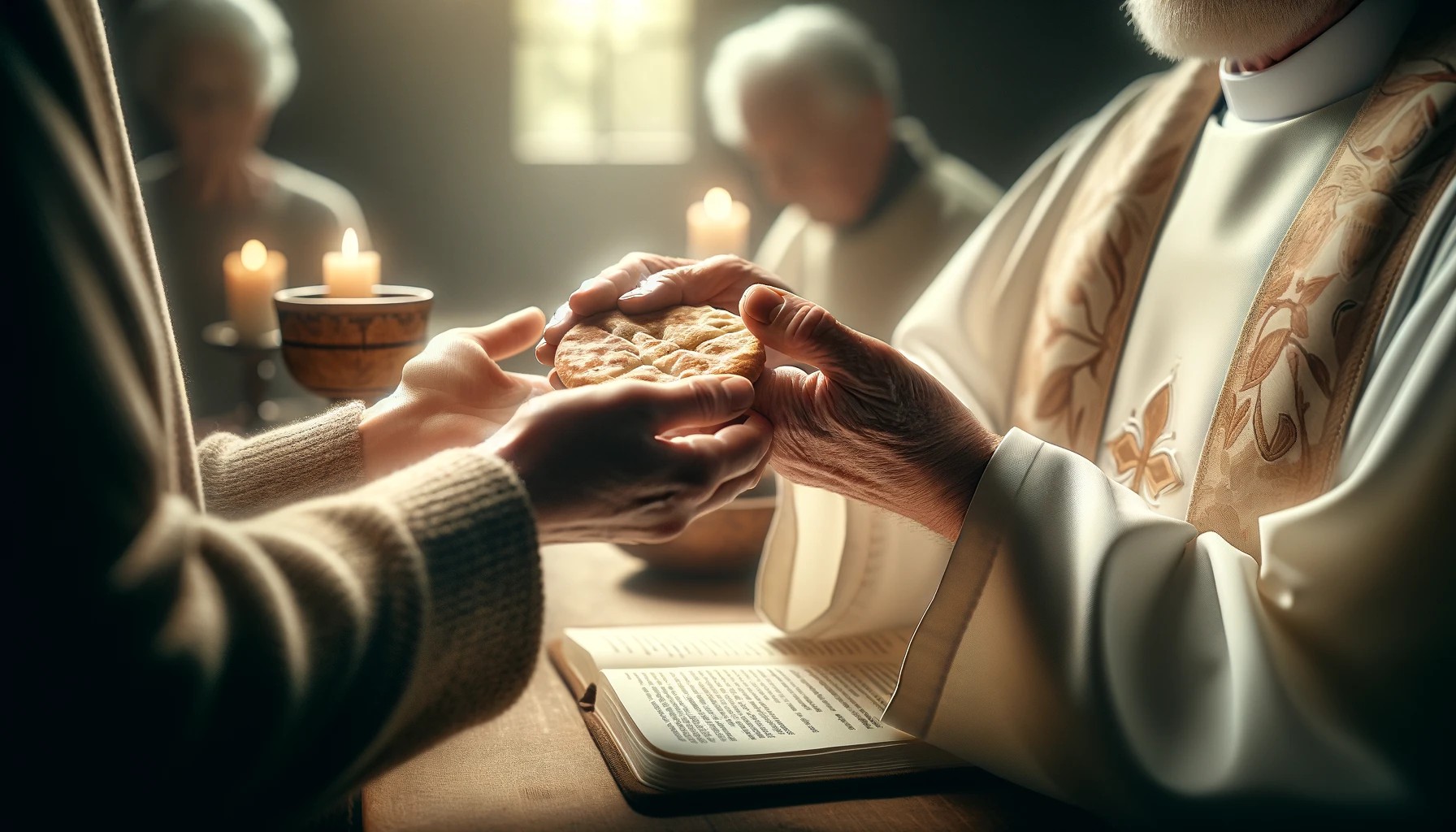Home>Theology and Spirituality>When Not To Take Communion


Theology and Spirituality
When Not To Take Communion
Published: February 19, 2024
Jason DeRose, Managing Editor at Christian.net, uses his expertise in religion and journalism to deepen understanding of faith's societal impacts. His editorial leadership, coupled with a strong academic background, enriches the platform’s diverse content, earning him recognition in both journalism and religious circles.
Learn about the circumstances when it may be inappropriate to take communion. Explore the theological and spiritual considerations.
(Many of the links in this article redirect to a specific reviewed product. Your purchase of these products through affiliate links helps to generate commission for Christian.net, at no extra cost. Learn more)
Table of Contents
Introduction
Communion, also known as the Eucharist or the Lord's Supper, holds profound significance in Christian faith and practice. It is a sacred ritual that symbolizes the body and blood of Jesus Christ and serves as a powerful means of spiritual nourishment and unity within the Christian community. However, there are certain circumstances in which partaking in communion may not be appropriate or beneficial for individuals. Understanding these situations is essential for maintaining the sanctity and reverence of this sacred sacrament.
In the following sections, we will explore the five key scenarios in which it may be advisable for individuals to refrain from taking communion. Each of these situations is rooted in the principles of repentance, forgiveness, understanding, unity, and reverence, which are fundamental to the Christian faith. By examining these considerations, individuals can approach the act of communion with a deeper awareness of its spiritual significance and the state of their own hearts and minds.
As we delve into these scenarios, it is important to approach the topic with humility and a spirit of discernment. The goal is not to instill fear or judgment but rather to foster a deeper understanding of the spiritual dynamics at play when participating in communion. Ultimately, the decision to partake in communion rests with each individual, guided by their personal relationship with God and their commitment to living according to the teachings of Christ.
With this in mind, let us explore the circumstances in which refraining from communion may be a thoughtful and reverent choice, rooted in the principles of spiritual discernment and self-examination.
Read more: When Do Baptists Take Communion
Unrepentant Sin
Unrepentant sin refers to the state of persisting in sinful behavior without genuine remorse or a desire to change. In the context of partaking in communion, unrepentant sin poses a significant spiritual challenge. The act of communion is deeply intertwined with the concept of repentance and forgiveness, serving as a symbolic reenactment of Jesus' sacrifice for the atonement of sins. Therefore, approaching communion with unaddressed and ongoing sinful behavior can undermine the sanctity of the ritual and hinder the individual's spiritual growth.
When individuals harbor unrepentant sin in their hearts, partaking in communion can become a superficial or even hypocritical act. It is essential to recognize that the purpose of communion extends beyond a mere ritual; it is a sacred opportunity for believers to reaffirm their commitment to Christ, seek spiritual renewal, and reconcile with God and others. However, unrepentant sin erects a barrier to this process, preventing individuals from experiencing the fullness of spiritual restoration and communion with God and the Christian community.
In such circumstances, it is advisable for individuals to refrain from taking communion and instead engage in sincere introspection and repentance. This entails acknowledging and taking responsibility for one's sinful actions, seeking forgiveness from God, and making a genuine effort to amend one's ways. By doing so, individuals can approach communion with a clear conscience and a renewed spirit, fully embracing the transformative power of the sacrament.
Moreover, addressing unrepentant sin aligns with the biblical exhortation to "examine oneself" before partaking in communion (1 Corinthians 11:28). This self-examination involves a candid assessment of one's thoughts, actions, and attitudes, with a willingness to confront and address any areas of unrepentant sin. Through this process, individuals can cultivate a deeper awareness of their spiritual condition and open themselves to the restorative grace and mercy of God.
Ultimately, refraining from communion due to unrepentant sin is not a punitive measure but a compassionate invitation to seek reconciliation and spiritual renewal. It reflects a commitment to honoring the sacredness of the ritual and embracing the transformative power of repentance and forgiveness. By addressing unrepentant sin with humility and sincerity, individuals can prepare their hearts to fully partake in communion, experiencing its profound significance and the redemptive love of Christ.
Unforgiveness
Unforgiveness, the refusal to pardon or release feelings of resentment or bitterness toward others, can significantly impact an individual's readiness to partake in communion. The act of communion embodies the spirit of forgiveness and reconciliation, reflecting the sacrificial love and forgiveness extended by Jesus Christ. However, when individuals harbor unforgiveness in their hearts, it creates a barrier to experiencing the fullness of communion's transformative power.
Unforgiveness not only hinders personal spiritual growth but also disrupts the unity and harmony within the Christian community. It fosters a sense of discord and division, contradicting the fundamental principles of love, compassion, and reconciliation central to the Christian faith. As such, approaching communion while holding onto unforgiveness can undermine the sacredness of the ritual and perpetuate a state of spiritual discord within oneself and the community.
Partaking in communion while harboring unforgiveness can also lead to a superficial or insincere engagement with the sacrament. It becomes challenging to fully embrace the symbolism of Christ's sacrifice and the call to unity and love among believers when one's heart is burdened by unresolved animosity or resentment. This discordance between the outward act of communion and the internal state of unforgiveness diminishes the spiritual impact of the ritual and detracts from its transformative potential.
In light of these considerations, individuals grappling with unforgiveness are encouraged to engage in a process of introspection and reconciliation before participating in communion. This involves acknowledging the presence of unforgiveness, examining its roots, and actively seeking avenues for forgiveness and healing. By doing so, individuals can align their hearts with the spirit of forgiveness exemplified by Jesus Christ, fostering a disposition of grace, compassion, and reconciliation.
Furthermore, addressing unforgiveness aligns with the teachings of Jesus, who emphasized the importance of forgiveness in the Lord's Prayer and through parables such as the Prodigal Son. Embracing forgiveness not only aligns individuals with the core tenets of the Christian faith but also enables them to experience the liberating power of grace and reconciliation, preparing them to partake in communion with a heart attuned to the transformative love of Christ.
Ultimately, refraining from communion due to unforgiveness is not a punitive measure but a compassionate invitation to seek reconciliation and spiritual renewal. It reflects a commitment to honoring the sacredness of the ritual and embracing the transformative power of forgiveness and unity. By addressing unforgiveness with humility and sincerity, individuals can prepare their hearts to fully partake in communion, experiencing its profound significance and the redemptive love of Christ.
Lack of Understanding
Lack of understanding, particularly regarding the significance and spiritual depth of communion, can present a compelling reason for individuals to refrain from partaking in this sacred ritual. Communion holds profound theological and symbolic meaning within Christian tradition, representing the sacrificial body and blood of Jesus Christ and serving as a tangible expression of spiritual nourishment and unity within the community of believers.
When individuals lack a comprehensive understanding of the theological underpinnings and spiritual implications of communion, their participation in the ritual may become superficial or devoid of the profound reverence it warrants. Without a deep grasp of the symbolism and significance of communion, individuals may inadvertently overlook the transformative power inherent in this sacred act, thereby limiting its impact on their spiritual lives.
Furthermore, a lack of understanding can lead to a diminished sense of personal connection to the communal aspect of communion. The ritual is not merely an individualistic expression of faith but a communal gathering that signifies the unity and shared identity of believers in Christ. Without a clear understanding of this communal dimension, individuals may fail to fully appreciate the interconnectedness and mutual support that communion fosters within the Christian community.
In light of these considerations, individuals who find themselves grappling with a lack of understanding regarding the theological and communal dimensions of communion are encouraged to engage in intentional study, reflection, and dialogue within the faith community. This process involves delving into the biblical and theological foundations of communion, seeking guidance from spiritual mentors or leaders, and participating in discussions that deepen one's grasp of the ritual's significance.
By actively pursuing a deeper understanding of communion, individuals can cultivate a more profound and meaningful engagement with the ritual, aligning their hearts and minds with its transformative power. This journey of comprehension and reflection not only enriches the individual's spiritual experience but also contributes to the communal unity and reverence surrounding the act of communion.
Ultimately, refraining from communion due to a lack of understanding is not a sign of spiritual deficiency but a humble acknowledgment of the need for deeper insight and connection to the sacred ritual. It reflects a commitment to honoring the profound significance of communion and embracing its transformative potential through a heart and mind attuned to its theological and communal dimensions.
Disunity within the Church
Disunity within the church, characterized by internal conflicts, divisions, or lack of harmony among believers, presents a poignant reason for individuals to consider refraining from partaking in communion. The act of communion embodies the spirit of unity and mutual love among believers, reflecting the communal bond and shared identity grounded in the teachings of Jesus Christ. However, when disunity pervades the church community, it undermines the foundational principles of love, reconciliation, and collective worship, thereby impacting the sanctity and transformative potential of the communion ritual.
Disunity within the church not only disrupts the harmonious fellowship among believers but also diminishes the communal witness of the Christian faith to the world. It creates a discordant environment that runs counter to the spirit of love, compassion, and mutual support that communion seeks to foster. As a result, individuals may find it challenging to authentically engage in communion when the communal fabric of the church is frayed by internal strife or division.
Partaking in communion amidst disunity within the church can lead to a fragmented or disingenuous expression of the ritual's significance. It becomes difficult for individuals to fully embrace the symbolism of Christ's sacrifice and the call to unity and love among believers when the communal body of believers is marred by discord and division. This dissonance between the outward act of communion and the internal state of disunity detracts from the ritual's transformative power and hinders the collective experience of spiritual nourishment and renewal.
In light of these considerations, individuals confronted with disunity within the church are encouraged to actively pursue avenues for reconciliation, healing, and restoration of communal unity. This process involves engaging in open dialogue, seeking mutual understanding, and fostering a spirit of forgiveness and reconciliation within the church community. By addressing the underlying causes of disunity and working towards communal harmony, individuals can contribute to the restoration of the church's collective witness and prepare the ground for a more profound and authentic engagement with the ritual of communion.
Furthermore, addressing disunity within the church aligns with the teachings of Jesus, who emphasized the importance of unity and love among believers. By actively participating in efforts to mend divisions and restore communal harmony, individuals embody the transformative power of reconciliation and contribute to the communal sanctity of the communion ritual. This intentional pursuit of unity within the church community not only enriches the collective experience of communion but also reflects a commitment to honoring the sacredness of the ritual and embracing its transformative potential through a unified and reconciled body of believers.
Ultimately, refraining from communion due to disunity within the church is not a sign of spiritual defeat but a humble acknowledgment of the need for communal healing and restoration. It reflects a commitment to honoring the profound significance of communion and embracing its transformative potential through a unified, reconciled, and harmonious church community.
Read more: When Do You Take Communion At Church
Unworthy Participation
Unworthy participation in the act of communion pertains to approaching the ritual without due reverence, discernment, or a genuine acknowledgment of its spiritual significance. The concept of unworthy participation is rooted in the biblical admonition found in 1 Corinthians 11:27-29, which urges believers to examine themselves before partaking in communion and to do so in a manner that honors the sacred nature of the ritual.
When individuals engage in unworthy participation, they risk trivializing the profound symbolism and transformative power inherent in communion. This can manifest in various forms, such as approaching the ritual with a casual or indifferent attitude, neglecting the call to self-examination and repentance, or failing to recognize the communal and theological dimensions of the sacrament. Such an approach undermines the sanctity of communion and diminishes its potential to foster spiritual nourishment, renewal, and communal unity.
Unworthy participation also encompasses a lack of discernment regarding the spiritual state and disposition of one's heart and mind. It involves partaking in communion without a genuine commitment to living in accordance with the teachings of Christ, embracing the call to love, forgiveness, and reconciliation, and actively seeking spiritual growth and transformation. This form of participation disregards the solemnity of communion and its call to a genuine, heartfelt engagement with the redemptive love and sacrifice of Jesus Christ.
In light of these considerations, individuals confronted with the prospect of unworthy participation are encouraged to engage in deliberate self-examination, sincere introspection, and a recommitment to the foundational principles of the Christian faith. This process involves cultivating a deep reverence for the ritual of communion, acknowledging one's spiritual vulnerabilities and areas in need of growth, and embracing a disposition of humility, gratitude, and reverence.
By approaching communion with a spirit of worthy participation, individuals honor the sacredness of the ritual and open themselves to its transformative potential. This intentional and reverent engagement with communion reflects a genuine desire to commune with God and the Christian community, seeking spiritual nourishment, renewal, and a deeper alignment with the redemptive love and grace of Jesus Christ.
Ultimately, refraining from communion due to a sense of unworthy participation is not a sign of spiritual inadequacy but a humble acknowledgment of the need for a more profound and reverent approach to the ritual. It reflects a commitment to honoring the sacredness of communion and embracing its transformative potential through a heart and mind attuned to its profound significance and spiritual depth.














